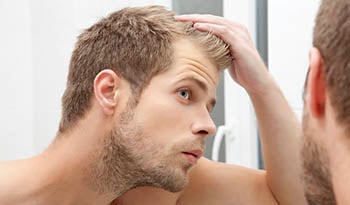Natural Approaches to Healthy Hair
DISCLAIMER:This blog does not intend to provide diagnosis...
- In this article:
- Four types of hair loss:
- Hormone Issues
- Thyroid Disease
- Sugar Abnormalities
- Abnormal Testosterone
- Estrogen Imbalance
- Digestive Issues
- High Blood Pressure
- Poor Diet
- Vitamins and Minerals That Might Help With Hair Loss
- Biotin
- Collagen
- Iron
- Vitamin D
- Zinc
- Omega-3 Fatty Acids
- Adaptogens That Might Help With Hair Loss
- Essential Oils That Might Help With Hair Loss
- Lavender
- Peppermint
- Rosemary

Every week, patients come into my office with concerns of excessive hair loss. On average, a head of human hair contains 100,000 hair follicles. When you’re young, your hair normally retains its pigment and fullness. However, as you age, pigment is lost, hair follicles eventually become gray, and thinning also occurs. Keeping a full head of hair is the goal of many, but unfortunately is not always achievable due to various life situations, stresses, imbalances, and medical issues.
There are three phases of growth through which hair goes:
- Anagen
- Catagen
- Telogen
At any given time, 90 percent of hair follicles are in the growth, or anagen, phase. This phase usually lasts three to five years. The catagen phase is a short transition phase that lasts about 10 days, leading to the telogen phase. Known as the “resting phase”, telogen is when our hair naturally falls out. If there is a disruption early on during the anagen phase, the hair will rapidly enter into the telogen phase, which will result in more rapid or premature hair loss.
Telogen effluvium (TE) is the most common cause of hair loss which occurs during unexpected times. For example, I have seen this occur in women who have just delivered a baby. Other times, I have seen it in patients diagnosed with a chronic illness, or sometimes when a person who has undergone some other stressful life event. Those undergoing treatment for cancer also frequently lose hair as the hair follicles are affected more easily during the anagen phase.
Hormone Issues
Hormone issues can come about due to various reasons. Those with poor diet and excess weight are at risk to develop a hormone imbalance like those below, which result in premature hair loss.
Thyroid Disease
A common cause of thyroid disease is either iodine deficiency or an auto-immune disease called Hashimoto’s thyroiditis. Both can increase the risk of hair loss.
Sugar Abnormalities
Insulin is the hormone released when one consumes sugar or simple carbohydrates (which break down into sugar). A person on a high-sugar, high-carbohydrate diet usually has higher than normal insulin levels. Not only can this lead to obesity, but it can also cause insulin resistance, a condition which increases the risk of hair loss. Cleaning up your diet and reaching an optimal weight can help you avoid these abnormalities.
Abnormal Testosterone
As men age, testosterone levels fall. Having excess weight or diabetes, or using chronic pain medication can all contribute to lower testosterone. This can result in premature hair loss. Women can also have elevated testosterone, especially if insulin levels are high (from too much sugar). This frequently leads to hair loss.
Estrogen Imbalance
The risk for premature hair loss is increased by estrogen imbalance. Women who are overweight or obese are at increased risk as fat tissue secretes additional estrogen, which can affect a woman’s cycle and overall hormone balance.
Digestive Issues
Digestive issues are common in those with premature hair loss. Those with leaky gut often have reduced absorption of important vitamins and minerals. Common signs of leaky gut include intestinal bloating and bowel abnormalities, such as frequent diarrhea.
Bloating is usually a sign of food intolerance. I always tell my patients, “Humans do not make gas”. However, the gut bacteria in our intestines, when feed certain foods, will result in gas formation. Most common foods to which one may be intolerant are wheat products (i.e gluten), dairy (lactose, casein), corn (corn syrup, maltodextrin), soy, and certain cruciferous vegetables (broccoli, cauliflower, Brussel sprouts). In addition to avoiding such trigger foods, optimizing gut health using digestive enzymes and probiotics may be helpful.
Chronic diarrhea also can be caused by common food triggers which can result in an imbalance within the intestines. Repairing a leaky gut will help improve the absorption of important nutrients. Again, digestive enzymes and probiotics may be helpful.
High Blood Pressure
High blood pressure, also known as hypertension, is a well-known risk factor for heart disease, kidney disease, and stroke. However, it also increases the risk for hair loss in men and women. Taking measures to reverse or at least control high blood pressure is important. Consult with your physician if you have high blood pressure.
Poor Diet
A poor diet can result in undernourishment and reduced absorption of vitamins and minerals, which can contribute to premature hair loss. Focusing on a well-balanced diet is crucial to ensure adequate vitamins and minerals are consumed. A multivitamin should also be considered is one’s diet is suboptimal.
Vitamins and Minerals That Might Help With Hair Loss
Biotin
Commonly taken to help with premature hair loss and poor nail growth, biotin is in the class of B vitamins. While I have seen some patients benefit, some studies suggest the evidence is not conclusive. However, a 2016 study in the International Journal of Trichology did show that 38 percent of women experiencing hair loss did have a biotin deficiency.
Collagen
Collagen supplements contain a wide variety of amino acids necessary for hair growth as well as skin, tendons, and bone health. They are a good option for those who may want to ensure they are getting adequate amino acids. Suggested dose: as directed on the label.
Iron
Women under the age of 50 are at increased risk for an iron deficiency when compared to men. However, both can be affected, especially when iron loss results from digestive system issues. According to a study in Skin Physiology and Pharmacology, low levels of iron also increase the risk of routine hair loss. It is important that the cause of an iron deficiency be evaluated by your physician, and once determined, iron supplementation should be considered. Taking iron with vitamin C helps increase absorption. Consult with your physician prior to taking.
Vitamin D
Nearly four in five people throughout the world, including my own patients in sunny Southern California, are vitamin D deficient. Low levels of vitamin D have been associated with increased risk for numerous health conditions from weak bones and muscle aches to various cancers. It is no surprise that healthy vitamin D blood levels are also important for healthy skin and hair. Studies have shown that low levels of vitamin D are associated with increased risk for alopecia areata and that supplementing may reduce the severity once developed, according to a study in Clinical and Experimental Medicine.
Zinc
According to a 2013 study in the Journal Of Drugs in Dermatology, zinc levels should be measured in those with routine hair loss due to telogen effluvium, the most common cause of hair loss. If low, repletion using a multivitamin or a separate zinc supplement can be considered.
Omega-3 Fatty Acids
Omega-3 fatty acids may also be beneficial, according to studies. A 2015 study in the Journal of Cosmetic Dermatology concluded that essential fatty acids play an important role in helping prevent hair loss. Animal studies have shown similar findings.
Adaptogens That Might Help With Hair Loss
Rhodiola and ashwagandha are two common adaptogens which can also be helpful. Adaptogens help the body during times of stress by balancing out hormone. This is believed to be the mechanism by which they help prevent hair loss.
Essential Oils That Might Help With Hair Loss
Lavender
Probably one of the most well known and recognized of all essential oils, lavender and its oil has been used for thousands of years by cultures all over the world. Its earliest recorded use was by the Greeks and Romans. This popular essential oil has many therapeutic benefits. When applied topically to the scalp, it can encourage hair growth.
Peppermint
A 2014 study in Toxicological Research demonstrated when peppermint was applied topically, can help with hair growth. More studies are needed.
Rosemary
A 2015 study compared rosemary with the FDA-approved drug minoxidil (Rogaine). Results were similar in that rosemary showed improved hair growth, just like the drug, when applied topically to the scalp. It took six months, however, for growth to be seen, so patience is required.
References:
- Skin Appendage Disord. 2017 Aug;3(3):166-169. doi: 10.1159/000462981. Epub 2017 Apr 27. (biotin and hair loss)
- Int J Trichology. 2016 Apr-Jun;8(2):73-7. doi: 10.4103/0974-7753.188040.
- Skin Pharmacol Physiol. 2013;26(2):101-7. doi: 10.1159/000346698. Epub 2013 Feb 20. (Iron and hair loss)
- J Eur Acad Dermatol Venereol. 2018 Jul;32(7):1214-1221. doi: 10.1111/jdv.14987. Epub 2018 May 18. (Vitamin D and alopecia areata)
- Clin Exp Med. 2018 Nov;18(4):577-584. doi: 10.1007/s10238-018-0511-8. Epub 2018 Jun 4. (Vitamin D and the severity of AA)
- J Drugs Dermatol. 2016 Oct 1;15(10):1235-1237. (Zinc and hair loss)
- J Cosmet Dermatol. 2015 Mar;14(1):76-82. doi: 10.1111/jocd.12127. Epub 2015 Jan 8. (Essential fatty acids and hair loss)
- J Med Primatol. 2017 Oct;46(5):248-251. doi: 10.1111/jmp.12271. Epub 2017 May 2.
- Lee BH, Lee JS, Kim YC. Hair Growth-Promoting Effects of Lavender Oil in C57BL/6 Mice. Toxicological Research. 2016;32(2):103-108. doi:10.5487/TR.2016.32.2.103.
- Oh JY, Park MA, Kim YC. Peppermint Oil Promotes Hair Growth without Toxic Signs. Toxicological Research. 2014;30(4):297-304. doi:10.5487/TR.2014.30.4.297.
- Skinmed. 2015 Jan-Feb;13(1):15-21. Rosemary helps hair growth

 By Dr. Eric Madrid, M.D.
By Dr. Eric Madrid, M.D.


